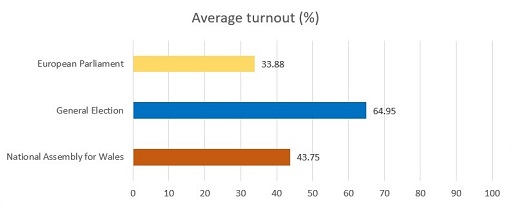5 Low voter turnout
Voter turnout is often viewed as an indicator of the health of a democracy. The lower the numbers of people making the effort to vote, the less interested they are in the activities of the politicians they elected.
Turnout has been declining across the UK since its highest levels of around 80% in the 1950s. Turnout in an election to the Welsh Parliament has never exceeded 60%.
Writing in the British Journal of Political Science in 2004, Roger Scully, Richard Wyn Jones and Dafydd Trystan identified three possible reasons for this: antipathy to the Welsh institutions, apathy to the Welsh institutions or apathy to politics more generally. They suggest apathy – in Wales and to politics more generally – are the most likely reasons. This is borne out in the table below which suggests votes where the stakes feel very high, such as the Brexit referendum, have the highest levels of turnout.
| Year | Election | Turnout in Wales (%) |
| 1997 | Devolution referendum | 50.22 |
| 1999 | National Assembly for Wales | 46.3 |
| 1999 | European Parliament | 29 |
| 2001 | General Election | 61.6 |
| 2003 | National Assembly for Wales | 38.2 |
| 2004 | European Parliament | 41.4 |
| 2005 | General Election | 62.4 |
| 2007 | National Assembly for Wales | 43.7 |
| 2009 | European Parliament | 30.4 |
| 2010 | General Election | 64.9 |
| 2011 | Devolution referendum | 35.6 |
| 2011 | National Assembly for Wales | 42.2 |
| 2014 | European Parliament | 31.5 |
| 2015 | General Election | 65.6 |
| 2016 | National Assembly for Wales | 45.3 |
| 2016 | EU referendum | 71.7 |
| 2017 | General Election | 68.6 |
| 2019 | European Parliament | 37.1 |
| 2019 | General Election | 66.6 |

